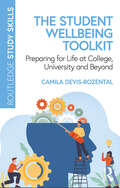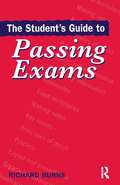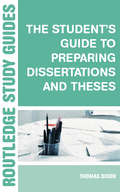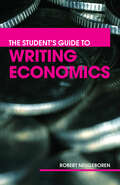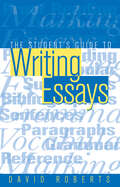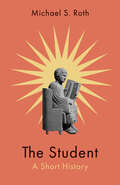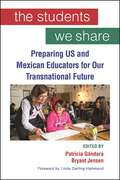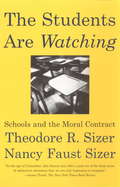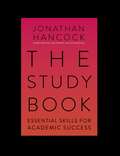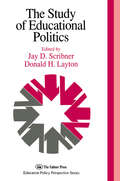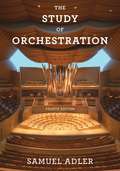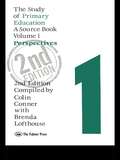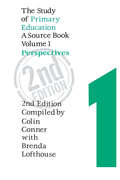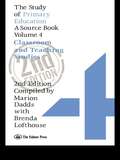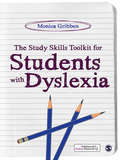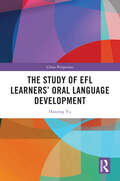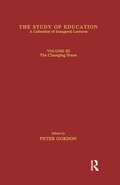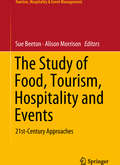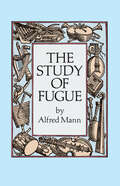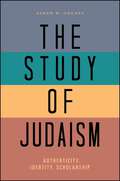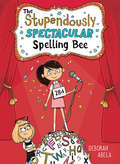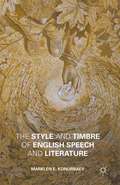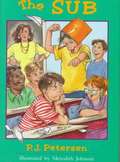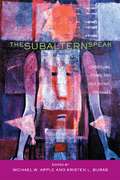- Table View
- List View
The Student Wellbeing Toolkit: Preparing for Life at College, University and Beyond (Routledge Study Skills)
by Camila Devis-RozentalThe Student Wellbeing Toolkit puts wellbeing at the centre of your journey into university and beyond. By encouraging self-efficacy and a focus on the things you can control, it provides clear guidance to enhance wellbeing and opportunities for self-reflection that help develop self-awareness and prosocial skills for life. Offering an accessible toolkit of strategies, activities and tips this fantastic, accessible resource considerers wellbeing within six main areas: Physical wellbeing Socio-emotional wellbeing Intellectual wellbeing Environmental wellbeing Occupational wellbeing Financial wellbeing Drawing on research-evidenced theories around positive psychology, theories of learning, motivation and self-development, the book explores what, how and why these areas are key to our wellbeing and the rationale for taking them into account to enable you to flourish and thrive at university.
The Student's Guide to Passing Exams
by Burns, RichardIn a lively style, this text shows how anyone can improve their chances of exam success by following a few simple rules. It contains tips for exam preparation and for improving performance in the exam itself.
The Student's Guide to Preparing Dissertations and Theses
by Phil Race Brian AllisonWhen writing a dissertation or thesis, it is essential to produce a work that is well-structured and well-presented. Giving clear examples throughout, this book offers all the practical advice that students will need, when writing a dissertation or thesis. Part 1: Content - from the layout order of contents to the compilation of the bibliography and appendices Part 2: Presentation and Style - the details of how work should be presented and covering aspects such as writing styles, page numbers, margins and abbreviations. The first edition of this book contributed to improving countless dissertations and this new edition will continue to do the same - using the practical advice and guidance it offers could mean the difference between success and failure.
The Student's Guide to Writing Economics
by Robert H. NeugeborenUnderstanding the way economists see the world is a necessary step on the way to good economics writing. This book guides students through the means and methods of economics writing, by taking a step by step approach investigating: the keys needed to succeed as a writer of economics and an overview of the writing process from beginning to end the basic methods economists use to analyze data and communicate their ideas suggestions for finding and focusing one's topic, including standard economic sources and techniques for doing economic research how to write paper ways of citing sources and creating a bibliography. It also contains useful appendices, which provide details of statistical sources and relevant electronic indices. Used as a standard guide for economics students at Harvard University, this book is of immense practical use to economics students the world over.
The Student's Guide to Writing Essays
by David RobertsThis text is divided into two sections: a core element focusing on basic skills which everyone needs to master in writing essays, and a subject-based section which takes the student to a more advanced level.
The Student: A Short History
by Michael S. RothFrom the president of Wesleyan University, an illuminating history of the student, spanning from antiquity to Zoom In this sweeping book, Michael S. Roth narrates a vivid and dynamic history of students, exploring some of the principal models for learning that have developed in very different contexts, from the sixth century BCE to the present. Beginning with the followers of Confucius, Socrates, and Jesus and moving to medieval apprentices, students at Enlightenment centers of learning, and learners enrolled in twenty-first-century universities, he explores how students have been followers, interlocutors, disciples, rebels, and children becoming adults. There are many ways to be a student, Roth argues, but at their core is developing the capacity to think for oneself by learning from others, and thereby finding freedom. In an age of machine learning, this book celebrates the student who develops more than mastery, cultivating curiosity, judgment, creativity, and an ability to keep learning beyond formal schooling. Roth shows how the student throughout history has been someone who interacts dynamically with the world, absorbing its lessons and creatively responding to them.
The Students We Share: Preparing US and Mexican Educators for Our Transnational Future
by Patricia Gándara; Bryant JensenMillions of students in the US and Mexico begin their educations in one country and find themselves trying to integrate into the school system of the other. As global migration increases, their numbers are expected to grow and more and more teachers will find these transnational students in their classrooms. The goal of The Students We Share is to prepare educators for this present and future reality. While the US has been developing English as a Second Language programs for decades, Mexican schools do not offer such programs in Spanish and neither the US nor Mexico has prepared its teachers to address the educational, social-psychological, or other personal needs of transnational students. Teachers know little about the circumstances of transnational students' lives or histories and have little to no knowledge of the school systems of the country from which they or their family come. As such, they are fundamentally unprepared to equitably educate the "students we share," who often fall through the cracks and end their educations prematurely. Written by both Mexican and US pioneers in the field, chapters in this volume aim to prepare educators on both sides of the US-Mexico border to better understand the circumstances, strengths, and needs of the transnational students we teach. With recommendations for policymakers, administrators, teacher educators, teachers, and researchers in both countries, The Students We Share shows how preparing teachers is our shared responsibility and opportunity. It describes policies, classroom practices, and norms of both systems, as well as examples of ongoing partnerships across borders to prepare the teachers we need for our shared students to thrive.
The Students are Watching
by Nancy Faust Sizer Theodore SizerIn this groundbreaking book, Theodore and Nancy Sizer insist that students learn not just from their classes but from their school's routines and rituals, especially about matters of character. They convince us once again of what we may have forgotten: that we need to create schools that constantly demonstrate a belief in their students.
The Students are Watching: Schools and the Moral Contract
by Nancy Faust Sizer Theodore SizerIn this groundbreaking book, Theodore and Nancy Sizer insist that students learn not just from their classes but from their school's routines and rituals, especially about matters of character. They convince us once again of what we may have forgotten: that we need to create schools that constantly demonstrate a belief in their students.
The Study Book: Essential Skills for Academic Success: Your Guide to Succeeding at Uni
by Jonathan HancockYOU WANT TO DO WELL AT UNI - NOW THERE'S A BOOK TO SUPPORT YOU. 'Everything you need to know to succeed in Higher Education' Gaye Conroy, University of Sussex'Great advice, strategies and models. I'd recommend it to our students' Sarah Speight, University of NottinghamTHE STUDY BOOK is a practical guide to developing the academic skills you need to succeed at university, college or any higher level study. Learn how to think, research, debate, write about, and apply information - and do all the things that will directly impact on your academic success from the moment you start.It guides you through activities and processes to help you examine your learning abilities and experiences so far. It will help you to understand your particular preferences and styles, your natural advantages as well as any specific weaknesses, and then guide you to build an effective personal approach to studying. You will learn what you need to do to do well in your course, like completing high quality assignments, writing essays, and showing off your full understanding in exams. Along the way you'll find emergency tips to inject into realistic situations like when struggling with the dynamics in a group-working situation, lost in planning a complex assignment, or getting stressed in the days before an exam. It contains specific reminders about academic conventions, definitions of terminology, useful checklists to support tasks, and simplified processes to keep you on track. There are insights from other students, example scenarios, and short case-studies, all designed to root the advice in real academic context, and keep you focused on what you need to do to keep improving.'A book that will help all students' Jeremy Dudman-JonesTHIS IS THE ESSENTIAL GUIDE TO TAKING ON THE CHALLENGE OF STUDYING - AND COMING OUT ON TOP.
The Study Of Educational Politics: The 1994 Commemorative Yearbook Of The Politics Of Education Association 1969-1994
by Jay D. Scribner Donald H. LaytonThis text is intended to be of use as a guide for students, scholars and researchers of the politics of education and of educational policy studies. The comprehensive work surveys major trends between 1969 and 1994, with chapters synthesising political and policy developments at local, national and state levels in the US as well as in the international arena. The text contains in-depth examinations of the emerging micropolitics of the field of education as well as policy analysis and cultural and feminist studies, and bibliographies are provided at the end of each chapter.; Designed as both a text and a reference volume, this special yearbook was planned in conjunction with the 25th anniversary of the Politics of Education Association in 1994.
The Study Of Orchestration
by Samuel AdlerThe third edition of this high successful orchestration text follows the approach established in its innovative predecessor: Learning orchestration is best achieved through familiarity with the orchestral literature; this familiarity is most effectively accomplished from the music notation in combination with the recorded sound. The text has been revised to reflect the most informed reactions to the first and second editions, as well as Professor Adler's revisions. For comprehensiveness, conciseness, and contemporaneity, The Study of Orchestration remains without peer.
The Study Of Primary Education: A Source Book - Volume 1: Perspectives
by Brenda Lofthouse Colin ConnerThe four books are intended to be used by students taking BEd or PGCE courses and by teachers in service, taking diploma or higher degree courses in primary education. The material extracted can by used by tutors as a focus for seminars or as reading to back up lectures, and by students as a source for essays or as a starting point for further reading. The books are not intended to be read straight through from cover to cover but can be selectively and flexibly used at various stages in the course. For convenience, the extracts have been organized into a number of sections. Volume 1 comprises extracts which examine primary education from historical, ideological, philosophical, sociological and psychological perspectives. Volume 2 deals with curriculum studies, Volume 3 with school organization and management and Volume 4 with teaching and classroom studies. Because of limitations of space, primary education has been confined to the education of children aged 5 to 11, though the compilers acknowledge that in doing so they may offend those teachers in nursery or middle schools who regard themselves, justifiably, as primary practitioners.
The Study Of Primary Education: A Source Book - Volume 3: School Organization And Management
by Brenda Lofthouse Colin ConnerFirst published in 1990. These books were compiled to help the professional development of primary school teachers, and represent wholly enlarged, updated and revised editions of the three primary source books.
The Study Of Primary Education: A Source Book - Volume 4: Classroom And Teaching Studies
by Marion Dadds Brenda LofthouseFirst published in 1990. Routledge is an imprint of Taylor & Francis, an informa company.
The Study Skills Toolkit for Students with Dyslexia (Sage Study Skills Ser.)
by Monica Gribben'This toolkit is the student's safety net offering user friendly, down to earth advice and real life skills that have been tried and tested by the author'-Dr John Schneider, Educational Psychologist, Edinburgh 'This is exactly how I felt starting university ... a wonderful and very helpful book full of interesting and useful hints and tips on how to survive university as a dyslexic student. It doesn't make you feel silly or stupid but makes you feel you can achieve what you set out to do'-Sharon Patterson, Adult Nursing student, Edinburgh Napier University 'You realize you're in the hands of a professional who has taught thousands of students how to succeed at university'-Holly Pellicer, Dyslexia Advisor, University of Oslo Packed with helpful advice, checklists and templates, this book will help you improve your study skills throughout your time at university. Written in a straightforward, no- nonsense style, the guidance can be broken down into manageable chunks. Issues covered include: - procrastination - planning your assignment - understanding your essay question - researching, writing and referencing your written work - managing your own well-being. Drawing on years of experience running study skills workshops in higher education, Monica Gribben has written an accessible book for students with dyslexia that shows how to work through the challenges that studying presents. The companion Website www.sagepub.co.uk/gribben has podcasts, worksheets and electronic resources to support each chapter. Monica Gribben is a private dyslexia consultant and Dyslexia Adviser at Edinburgh Napier University.
The Study of EFL Learners’ Oral Language Development (China Perspectives)
by Hanjing YuThe book provides a systematic investigation of the dynamic trajectories in the oral language development of English as a foreign language (EFL) learners, integrating both inter-individual variation and intra-individual variability. It also identifies unobserved heterogeneity in oral language production.Using longitudinal designs, comprehensive developmental data collection, and innovative analytic techniques, the study reveals distinct developmental trajectories in the oral language systems of EFL learners. It also examines the interactions among complexity, accuracy, and fluency (CAF), exploring the potential of complex dynamic systems theory (CDST)-inspired approaches to studying oral language development and their implications for teaching oral language to Chinese learners. In addition, by employing the novel growth mixture model (GMM) method, the study identifies salient developmental patterns of CAF within a larger population, thereby contributing to the generalizability of findings from CDST-based language development research.This book will be valuable to students, researchers, and educational practitioners interested in oral language development and complex dynamic systems theory.
The Study of Education: Inaugural Lectures : Volume Three : The Changing Scene
by Peter GordonThe inaugural lectures published in this volume reflect the many changes which have taken place in the study of education between the late 1970s and the mid 1980s. Changes in society are reflected in the lectures on special needs education and multicultural education and the contributions of educational administration and comparative educations as a field of study.
The Study of Food, Tourism, Hospitality and Events: 21st-Century Approaches (Tourism, Hospitality & Event Management)
by Sue Beeton Alison MorrisonThis book elaborates upon, critiques and discusses 21st-century approaches to scholarship and research in the food, tourism, hospitality, and events trades and applied professions, using case examples of innovative practice. The specific field considered in this book is also placed against the backdrop of the larger question of how universities and other institutions of higher learning are evolving and addressing the new relationships between research, scholarship and teaching.
The Study of Fugue (Dover Books On Music: Analysis)
by Alfred MannClassic study comprises two parts. The first is a comprehensive historical survey of writings on the fugue from the beginning of fugal teaching (c. 1350) to the present. Part Two explores in depth four 18th-century studies which are its classical presentations: Steps to Parnassus, J. J. Fux (1725), A Treatise on Fugue, F. W. Marpurg (1753-54), Fundamental and Practical Essay on Fugal Counterpoint, Padre Martini (1775), A Manual of the Fundamental Principles of Composition, J. A. Albrechtsberger (1790). Translations of texts, introductions and critical commentary, and many musical examples. Index. Bibliography.
The Study of Judaism: Authenticity, Identity, Scholarship
by Aaron W. HughesThe relationship between Jewish studies and religious studies is a long and complicated one, full of tensions and possibilities. Whereas the majority of scholars working within Jewish studies contend that the discipline is in a very healthy state, many who work in theory and method in religious studies disagree. For them, Jewish studies represents all that is wrong with the modern academic study of religion: too introspective, too ethnic, too navel-gazing, and too willing to reify or essentialize data that it constructs in its own image. In this book, Aaron W. Hughes explores the unique situation of Jewish studies and how it intersects with religious studies, noting particular areas of concern for those interested in the field's intellectual health and future flourishing. Hughes provides a detailed study of origins, principles, and assumptions, documenting the rise of Jewish studies in Germany and its migration to Israel and the United States. Current issues facing the academic study of Judaism are discussed, including the role of private foundations that seek inroads into the academy.
The Stupendously Spectacular Spelling Bee (The Spectacular Spelling Bee #1)
by Deborah AbelaA heartwarming story about a girl who's afraid to follow her dreams, and the family who help make them happen.India Wimple can spell. Brilliantly. Every Friday night, she and her family watch the Stupendously Spectacular Spelling Bee on TV. When the Wimples suggest she enter the next Bee, India feels nothing but trepidation. She's sure she's not good enough - but with the support of her family, India finds the courage to sign up. There are plenty of obstacles to reaching the finals, like Summer Millicent Ernestine Beauregard-Champion, a spoiled rich girl who isn't afraid to step on anyone who gets in her way of winning. The whole thing seems rather calamitous to India. But with hope, hard work, and a little bit of heart, something splendiferous might be on the horizon...
The Style and Timbre of English Speech and Literature
by Marklen E. KonurbaevThe book introduces the reader into the world of mental perception of literary contents. Based on the research in modern semantics, functional stylistics and cognitive phonetics, it explores the way linguistic elements of a literary work cause readers to form a single perception shape identified as a cultural, literary or social stereotype.
The Sub
by P. J. PetersenIt's not a good day for James. The teacher is out sick. So the class has to have a substitute. Yuk! That's no fun. Then James' best friend, Ray, comes up with a great idea. To play a joke on the sub, they decide to switch seats. Then she will think James is Ray and Ray is James. But the prank stops being funny pretty fast. Still the awful day drags on. And the worst is yet to come. The next day the sub is back! How can the boys get out of the mess they've made? The more trouble they get into, the more you will laugh. And when it's over, everyone learns a little something.
The Subaltern Speak: Curriculum, Power, and Educational Struggles
by Michael W. Apple Kristen L. BurasThe question of whose perspective, experience and history is privileged in educational institutions has shaped curriculum debates for decades. In this insightful collection, Michael W. Apple and Kristen L. Buras interrogate the notion that some knowledge is worth more than others. The Subaltern Speak combines an analysis of the ways in which various forms of power now operate, with a specific focus on spaces in which subaltern groups act to reassert their own perceived identities, cultures and histories.
